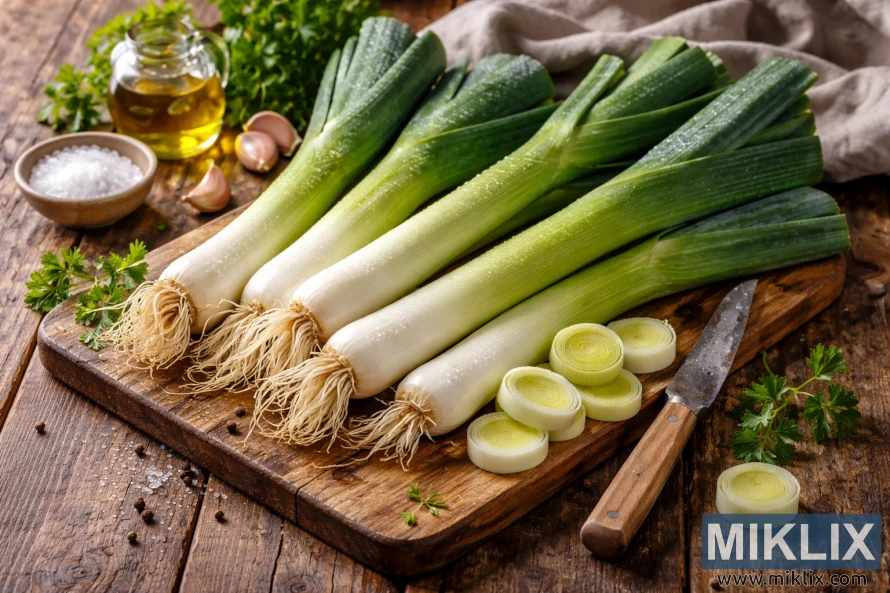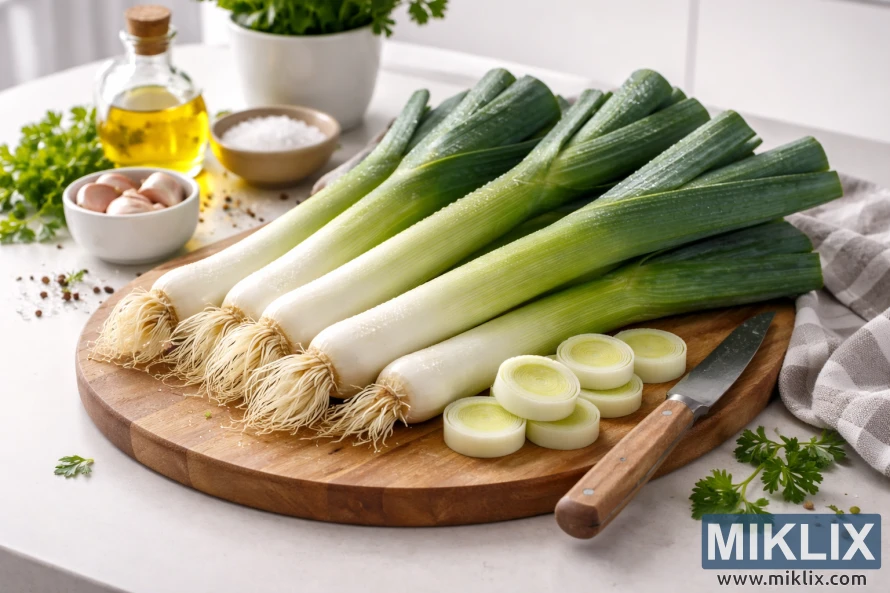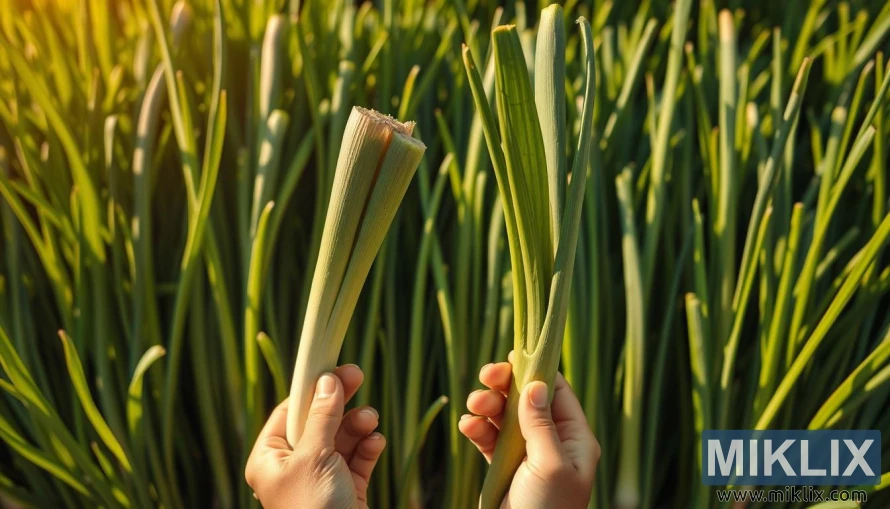Slim, Green, and Full of Power: The Health Benefits of Leeks
Published: May 21, 2025 at 12:46:58 PM UTC
Last updated: December 23, 2025 at 11:09:03 AM UTC
Leeks belong to the allium family, which also includes onions and garlic. They are known for their mild, sweet taste and high nutritional value. This vegetable is low in calories but rich in vitamins, minerals, and plant compounds. It's a great addition to any diet. In this article, we'll explore the health benefits of leeks. We'll see how they can improve overall health and well-being.

Key Takeaways
- Leeks are part of the allium vegetables family, which includes garlic and onions.
- They are low in calories yet rich in essential vitamins and minerals.
- The health benefits of leeks include support for heart health and digestive systems.
- Leeks may play a role in weight management and cancer protection.
- This versatile vegetable is easy to incorporate into a variety of dishes.
- Choosing the right leeks and proper storage enhance their nutritional value.
Introduction to Leeks
Leeks look like giant green onions and taste mild and sweet. They have a long, cylindrical shape. This leek vegetable is a favorite in many places, like Greece and Rome. People think it makes your voice sound better.
Leeks are not just tasty; they're also good for you. They grow well in rich soil and are found in many places. The introduction to leeks shows their great taste and health benefits. Chefs and home cooks love them for adding flavor and health to dishes.
Nutritional Profile of Leeks
Leeks are a great addition to any diet. They have a low calorie count of about 31 calories per 3.5 ounces. This makes them perfect for those trying to lose or maintain weight. They are also full of vitamins and minerals, which offer many health benefits and add flavor to meals.
Some of the main vitamins and minerals found in leeks are:
- Vitamin A
- Vitamin C
- Vitamin K
- Vitamin B6
- Manganese
- Iron
- Folate
- Potassium
Leeks are rich in vitamin K, which is key for bone health. They also have antioxidants like flavonoids and carotenoids. These help explain why leeks are good for a balanced diet.

Health Benefits of Leeks: An Overview
Leeks are packed with health benefits that can boost your diet. They belong to the allium family, like garlic and onions. They are full of nutrients and antioxidants.
Leeks help keep your heart healthy, aid in weight management, and may lower cancer risks. They are rich in vitamins A, C, and K. They also have minerals like manganese and iron.
These nutrients are key for better health and well-being. Leeks' fiber helps with digestion. Their anti-inflammatory properties boost the immune system.
Eating leeks regularly can improve your health. They add nutrients that support your body's functions. You can use them in soups, stews, and salads, making them easy to include in your meals.
Packed with Beneficial Plant Compounds
Leeks are a powerhouse of health-promoting plant compounds, making them a fantastic addition to your diet. They are rich in flavonoids, which add flavor and provide health benefits. Flavonoids and sulfur compounds in leeks help reduce inflammation and protect against chronic diseases.
Notable antioxidants in leeks include kaempferol and allicin. Kaempferol fights oxidative stress and lowers the risk of heart disease and some cancers. Allicin boosts your immune system with its antimicrobial benefits.
Eating leeks regularly can lower risks of heart disease, diabetes, and some cancers. They support cellular protection and aid in DNA repair. This shows how important leeks are for maintaining health.
Leeks and Heart Health
Leeks are great for heart health because of their nutritional value. They have anti-inflammatory properties that help the heart. Allicin in leeks is key, as it lowers cholesterol and blood pressure.
Studies show leeks are good for the heart, thanks to kaempferol. This flavonoid reduces heart disease risk. Eating leeks adds flavor and supports heart health.
Eating leeks regularly is beneficial for health. Add them to salads, soups, or stir-fries. They offer heart-healthy benefits.
Weight Loss Benefits of Leeks
Adding leeks to your meals can help you lose weight. They have only 31 calories in a 3.5-ounce serving. This makes them a great choice for those watching their calories.
Leeks are also full of water and fiber. These help you feel full, which can lower how much you eat. This can lead to eating fewer calories overall.
Leeks are good for weight loss because they're full of veggies. They can be used in many dishes, adding vitamins and minerals. They also make food taste better and feel more satisfying.

Leeks May Protect Against Certain Cancers
Leeks are not just tasty in many dishes. They also offer a natural way to fight cancer. Leeks contain compounds that help fight cancer. Kaempferol and allicin are two of these compounds.
Studies show that eating leeks might lower the risk of certain cancers. This includes gastric and colorectal cancers. Several factors contribute to this:
- Leeks are full of antioxidants. These help fight oxidative stress, which can lead to cancer.
- Leeks have anti-inflammatory properties. These can slow down cancer cell growth.
- Eating leeks regularly can boost the body's defenses. This makes it harder for cancer to grow.
Adding leeks to your meals can add flavor and help protect against cancer. Knowing about leeks' anti-cancer benefits helps you make better health choices.
Digestive Health and Leeks
Leeks are great for your digestive health. They are full of soluble fiber, which is key for a healthy gut. This fiber feeds good bacteria in your gut, helping keep your microbiome balanced.
Eating leeks can lead to better digestion and less inflammation. Research backs up the idea that fiber-rich foods like leeks help your body absorb nutrients better. This makes leeks a great choice for anyone looking to improve their digestive health.
Leeks and Immune System Support
Leeks are a tasty addition to any meal and boost your immune system. They are full of vitamin C, which helps repair tissues and keeps your immune system strong. Vitamin C also fights off infections and illnesses.
Leeks also contain allicin, a powerful anti-inflammatory. Eating leeks regularly can make your immune system stronger. This helps fight off inflammation and diseases.
Adding leeks to your meals is a simple way to improve your health. They can be used in soups, salads, or main dishes. Leeks give you important nutrients that support a healthy immune system.

Potential Benefits for Brain Function
Research suggests leeks might be good for our brains. They contain compounds like allicin and sulfur derivatives. These might help protect against brain decline as we age.
Leeks could improve our brain function and mental clarity. But, we need more studies to be sure. Eating leeks might be a tasty way to keep our minds sharp.
Versatility of Leeks in Cooking
Leeks are a versatile vegetable that can make many dishes better. They have a mild, sweet taste that goes well with lots of recipes. You can enjoy them raw in salads, adding a nice crunch and freshness.
Leeks are great in soups, stews, and casseroles. They soak up flavors well, making them perfect for hearty meals. You can try different cooking methods like:
- Sautéing them in olive oil for a rich, aromatic base.
- Roasting to bring out their natural sweetness.
- Grilling for a smoky twist.
These methods not only make the flavor better but also let you get creative with leeks. Adding leeks to your cooking not only tastes good but also adds nutrition. They are a must-have in every kitchen.
How to Choose and Store Leeks
When picking leeks, look for firm white shafts and bright green tops. Stay away from any that are browning or wilted. These signs can mean the leeks are going bad.
Keeping leeks fresh is key. Store raw leeks in the fridge for up to a week. Use a plastic bag to keep them moist. This keeps them crisp and flavorful for your recipes.
To prepare leeks, start by slicing them lengthwise. Then, rinse them under cold water. This removes dirt and lets you enjoy their full flavor in your dishes.
Other Possible Health Benefits of Leeks
Leeks are not just tasty in many dishes. They also offer health benefits beyond their flavor. Some studies show they might help lower blood sugar levels. This could be good for people with diabetes or those trying to improve their metabolism.
Leeks might also help the body fight off infections better. They are packed with vitamins and antioxidants. These nutrients can boost the immune system, helping the body stay healthy.
More research is needed, but the early findings are promising. Adding leeks to your meals can be a tasty way to support your health.
Conclusion
Leeks are a nutritional powerhouse with many health benefits. They add flavor and depth to dishes and support overall wellness. They help with heart health, fight cancer, and aid digestion.
Adding leeks to your meals is easy and beneficial. They are a key part of a healthy diet. These vegetables are more than tasty; they're a health ally.
When planning meals, think about including leeks. They can be sautéed, roasted, or in soups. They make your meals better and improve your health.

Further Reading
If you enjoyed this post, you may also like these suggestions:
- CLA Supplements: Unlocking the Fat-Burning Power of Healthy Fats
- Sweet Potato Love: The Root You Didn’t Know You Needed
- The Power of Plums: Sweet Fruit, Serious Health Perks
